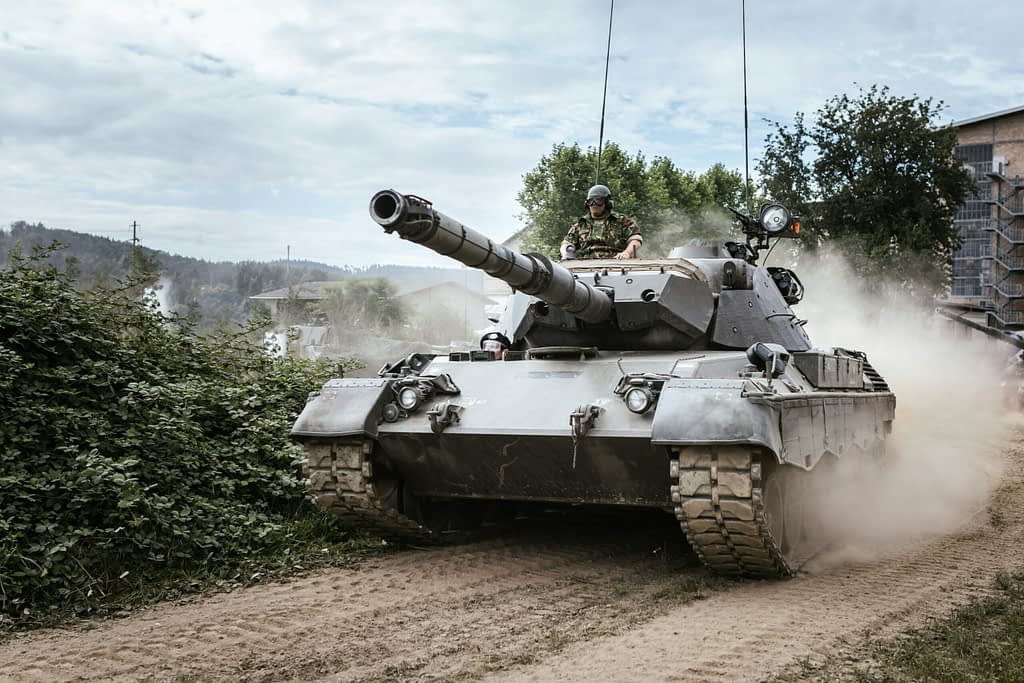What can double an entire sector’s value in just four years? For German defense companies, the answer is simple – geopolitical earthquake. Military exports skyrocketed to a record 13.2 billion euros, confirming Germany’s position as a key player in the global defense market. This record growth is driven by massive government investments in defense and enormous demand for military technologies.
Germany Strengthens Position Among Top Arms Exporters
According to research institute SIPRI, Germany ranked fifth among the world’s largest exporters of major weapons systems between 2020-2024. The latest export records from the German government show that 80% of arms exports in the first quarter went to “close partner countries,” including EU states, Japan, Switzerland, Australia, New Zealand, South Korea, Singapore, and Ukraine.
The remaining 20% of exports went to “other third countries,” with Qatar and Israel representing major players in this category. Germany’s largest markets in the 2020-2024 period were Ukraine with a 19% share, Egypt also with 19%, and Israel with 11% of total exports.
Export structure analysis reveals interesting trends in the types of weapons systems delivered:
- Ships and naval systems account for 41% of all major exports
- Armored vehicles represent 16% of total deliveries
- Missiles and projectiles reach 11% market share
- Engines and propulsion units comprise 9.5% of exports
Defense Stocks Achieve Record Growth Through Military Investments
German defense stocks reached record highs over the past twelve months following record government defense spending and a sharp surge in orders. Shares of Germany’s largest defense company Rheinmetall rose by more than 260%, while Hensoldt stock gained 168%.
This dramatic growth reflects fundamental changes in international security and rising military budgets of European countries. Investments in defense technologies have become a priority for the security sector across Europe.
Key Players in German Defense Industry
German defense companies represent key players in the global arms market with combined revenues exceeding tens of billions of euros. These defense giants benefit from growing demand for modern military systems.
Rheinmetall – German Giant in Weapons and Ammunition Rheinmetall, specializing in weapons, ammunition, and armored vehicles, benefits most from growing demand due to its position as Germany’s largest defense company and deep integration in the European defense system. It generates only one-third of revenues domestically. The rest of Europe represents 46.6% of sales, Asia and Middle East 9.6%, Americas 7.7%, and other regions 5.8%.
MTU Aero Engines – Pioneer in Military Aviation MTU Aero Engines recorded more than 13% revenue growth in its military division thanks to EJ200 engines for Eurofighter jets. North America accounts for 70% of total revenues, followed by Germany and European markets.
Hensoldt – Electronic Defense Specialist Hensoldt went public after spinning off from Airbus and records strong demand due to the war in Ukraine and Middle East crises. “Demand is growing globally, but with very high increases from Germany and Europe,” said CFO Christian Ladurner. Europe represents 87.8% of revenues, Middle East 3.7%, Asia 3.5%.
Renk and ThyssenKrupp Strengthen Global Presence Renk supplies gearboxes to more than 70 ground forces worldwide with revenues of 1.14 billion euros. Germany accounts for 27% of sales, USA 20%, and South Korea 11%. ThyssenKrupp Marine Systems achieves 30% of sales in the German-Austrian-Swiss region, 18% in South America, and 15% in Middle East and Africa.
Political Controversies and Ethical Challenges
Germany’s growing role in global arms trade is not without controversy. Politicians express concerns about exports to Israel given allegations of human rights violations in Gaza. Germany historically strongly supports Israel due to its role in the Holocaust.
Foreign Minister Johann Wadephul showed openness to reviewing arms exports to Israel, however at a recent NATO summit confirmed that arms sales to Israel will continue. German defense companies exporting to Israel include TKMS, which built Sa’ar 6 frigates for the Israeli Navy, and Renk with MTU supplying parts for Merkava tanks.
German exports to Ukraine are also sources of controversy. Since the large-scale Russian invasion, Germany became one of Ukraine’s biggest military supporters. Criticism comes from both political extremes – the far-left BSW demands halting German military support for Ukraine, while the far-right AfD wants to “stop delivering weapons and stop fueling the war.”
The German military industry thus faces a paradox of historic growth opportunities accompanied by rising ethical and political dilemmas regarding the global impact of these exports.




